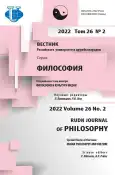Digital Dialogue in Learning: Cognitive, Social, Existential Features and Risks
- Autores: Baeva L.V.1
-
Afiliações:
- Astrakhan State University
- Edição: Volume 26, Nº 2 (2022): INDIAN PHILOSOPHY AND CULTURE
- Páginas: 439-453
- Seção: PRACTICAL PHILOSOPHY
- URL: https://journal-vniispk.ru/2313-2302/article/view/325335
- DOI: https://doi.org/10.22363/2313-2302-2022-26-2-439-453
- ID: 325335
Citar
Texto integral
Resumo
Digitalization of socio-cultural phenomena, including the education system, generates transformations of their qualitative characteristics and parameters, which requires research from the standpoint of methodological analysis and assessment of their possible consequences on humans and society. A significant element of the digital environment, in general, and educational, in particular, is the dialogue, the role of which has both cognitive and ideological, existential, social aspects. The purpose of the research is a philosophical analysis of the digital transformation of dialogue in the context of the educational process, an assessment of its potential and impact on the individual. The research methodology has a complex, interdisciplinary character and is associated with the application of an existential approach to understanding the essence of dialogue (M. Bakhtin, M. Buber, G. Marcel, E. Levinas), the theory of the development of individual thinking by L.S. Vygotsky, developed by the author of the theories of electronic (digital) culture and based on modern developments in the field of the introduction of digital tools in education. The study shows that dialogue in the digital learning environment becomes not so much a form of rapprochement, integration of subjects, as a form of autonomy, isolation, individuals, which changes the nature of learning and has social and existential consequences. This creates the need to transform the digital learning environment when using it from the position of supplementing it with ethical, socio-psychological and emotional components and support tools for the student. Based on the existential-axiological analysis, the positive and risky features of digital dialogue as one of the phenomena of electronic culture and online learning tools are revealed. The concept of digital dialogue in learning, the characteristics of its features, functions, role and influence on the learner in the digital environment are presented. The difficulties of dialogic learning characteristic of the digital environment are revealed, recommendations of a methodological and methodical nature for application in the education system are presented.
Palavras-chave
Sobre autores
Liudmila Baeva
Astrakhan State University
Autor responsável pela correspondência
Email: baevaludmila@mail.ru
ORCID ID: 0000-0003-0439-525X
Doctor of Philosophy, Professor of the Department of Philosophy, Vice Rector for Research Activities
20a, Tatischeva str., Astrakhan, 414056, Russian FederationBibliografia
- Akdag S, Altynai Z. Learning with the help of digital stories for a safe school environment. Frontiers in psychology. 2021;(12). Available from: https://www.frontiersin.org/articles/ 10.3389/fpsyg.2021.738954/full; https://doi.org/10.3389/fpsyg.2021.738954
- Babaсan S, Dogru Yuvarlakbas S. Digitalization in education during the COVID-19 pandemic: emergency distance learning of anatomy. Surgical and Radiologic Anatomy. 2021;(44):55—60. https://doi.org/10.1007/s00276-021-02827-1
- Bakanova IG, Yavorchikova J. Features of the organization of e-learning in a modern university. Bulletin of the Samara State Technical University. Series: Psychological and pedagogical sciences. 2020;17(4):5—15. https://doi.org/10.17673/vsstu-pps.2020.4.1 (In Russ).
- Iivari N, Sharma S, Venta-Olkkonen L. Digital transformation of everyday life. International Journal of Information Management, 2020;(55):102—183. https://doi.org/10.1016/j.ijinfomgt.2020.102183
- Song Z, Wang K, Bergman L. The digital divide in the prefectures of China: spatial analysis and multidimensional determinants of the spread of ICT. International Journal of Information Management. 2020. https://doi.org/10.1016/j.ijinfomgt.2020.102072
- Petrova NP, Bondareva GA. Digitalization and digital technologies in education. The world of science, culture, education. 2019;5(78):353—355. https://doi.org/10.24411/1991-5497-2019-00138 (In Russ).
- Levina EY. Digitalization — a condition or an era of development of the higher education system? Kazan Pedagogical Journal. 2019;5(136):8—14. (In Russ).
- Verbitsky AA. Digital learning: problems, risks and prospects. Electronic scientific journal “The species of Homo Cyberus”. 2019. No. 1(6). [Electronic resource] Available from: http://journal.homocyberus.ru/Verbitskiy_AA_1_2019 (In Russ).
- Semenov AL. Goals of general education in the digital world. Informatization of education and e-learning methodology. Materials of the III International Scientific Conference. [Noskov MV, editor]. Krasnoyarsk: SFU; 2019. pp. 383—388. (In Russ).
- Jacobson R. Linguistics and Poetics. In: Structuralism: “for” and “against”. Moscow: Progress; 1975. Р. 193—230. (In Russ).
- Bakhtin MM. Problems of Dostoevsky’s poetics. 3d ed. Moscow: “Hudozhestvennaya literatura” publ.; 1972. (In Russ).
- Buber M. Two images of faith. Moscow: Republic; 1995. (In Russ).
- Marcel G. Metaphysical diary. St. Petersburg: Nauka; 2005. (In Russ).
- Levinas E. Time and Another. The humanism of another person. St. Petersburg: Higher Religious-Philosophical School; 1998. (In Russ).
- Vygotsky LS. Thinking and Speech. Moscow: APN RSFSR; 1956. pр. 338—339. (In Russ).
- Mazur E. Instruction for peers: User’s Guide. New Jersey: Prentice-Hall; 1997.
- Deep “digital divide” in distance learning (21.04.2020) [Internet]. UNESCO. Available at: URL: https://ru.unesco.org/news/glubokiy-cifrovoy-razryv-v-distancionnom-obuchenii (аccessed: November 22, 2021).
- Sokhranyaeva TV, Zamotkin ID. The Problem of Matter of Education in the Digital Age. RUDN Journal of Philosophy. 2021;25(4):626—639. (In Russ). https://doi.org/10.22363/2313-2302-2021-25-4-626-639
- Varela F, Maturana U. The tree of knowledge. Biological roots of human cognition. Moscow: Progress—Tradition; 2001. (In Russ).
- Mercer N, Hennessy S, Warwick P. Dialogue, collaborative thinking and digital technologies in the classroom: some educational implications of continuing research. International Journal of Educational Research. 2019;(97):187—199.
Arquivos suplementares









